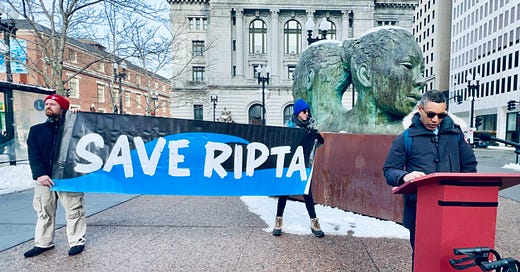Barry Schiller: Transportation equity in Rhode Island? Not really.
"The Rhode Island Public Transit Authority (RIPTA) projects a deficit of about $30 million, a deficit Governor Daniel McKee did not lower in the slightest in his proposed budget."
Rosa Parks, who famously resisted segregation on Montgomery, Alabama’s public buses, was born on February 4, so this time of year has become associated with celebrating “Transit Equity.”
While Rhode Island buses are not segregated, that doesn’t mean we have achieved equity. For those who use the buses or, more generally, do not drive, transportation equity is still an issue in numerous ways.
Our transit system today is so that many without cars cannot reasonably access jobs, schools, medical appointments, shopping, social events, and other destinations important to life.
This is not equitable,
Starting July 1, 2025, bus riders face massive cuts in bus service as the Rhode Island Public Transit Authority (RIPTA) projects a deficit of about $30 million in the fiscal year that begins then, a deficit Governor Daniel McKee did not lower in the slightest in his proposed budget.1
Last spring, RIPTA faced a deficit and riders’ loss of service until the last minute when the General Assembly passed a one-time addition to RIPTA’s budget. Thus, those who use transit cannot plam their lives because the buses will be there for them, especially as even larger deficits loom in subsequent years as the gas tax continues to decline. The State’s political leaders, who all drive everywhere, refuse to seriously address this, perhaps because they see transit as just a necessary service for the poor rather than a tool to help the economy and environment - thus a low priority. Yet they find over a billion dollars for massive highway capacity expansions to speed up trips for those who drive.
This is not equitable.
As bus riders are disproportionately low-income and people of color, politically connected downtown real estate interests want to send them away from Kennedy Plaza, even though it is where most riders want to go as it is near the Post Office, Providence City Hall, URI, the mall, banks, cafes, hotels, and more. While Kennedy Plaza has its problems, they can be addressed at vastly less cost than moving the hub, which can increase operating costs and cripple RIPTA with debt for years to come.
This is not equitable.
Another example is that the state allocates about $234 million yearly from the general fund to eliminate property taxes on private motor vehicles. This most benefits those with expensive cars and/or lots of cars, the very ones who contribute the most to pollution and congestion. Still, it is of no benefit to the many households with no cars or perhaps one older vehicle. The car tax, which exempted the first $5000 of vehicle value from the tax, was one of the few taxes on wealth. Its elimination may be politically popular as most households have cars and hence difficult to oppose.
This is not equitable.
I also note that after snowstorms, the State goes to great expense to remove snow from State roads for drivers but makes almost no effort to remove snow from its sidewalks to help those who walk,, including those who want to safely access bus stops or otherwise wish to walk.
This is not equitable.
Though Rhode Island State Law 39-18-2 says the Governor shall appoint a “diverse” Board of Directors at RIPTA, the actual Board now has seven white men and one white female that does not reflect the ridership it is supposed to help serve.
This is not equitable.
Note that despite years of advocacy for a State House bus shelter in honor of Rosa Parks, there is still no shelter there, even as three busy bus lines stop there, and an army of State workers, lobbyists, rally goers, and even tourists go to the area. The State has expanded parking, paved over a lot, and even made part of the State House lawn to accommodate drivers, but bus users continue to be neglected.
This is not equitable.
All who use transit are climate champions; some, voluntarily give up their cars to help the environment. Downgrading bus service for them is another inequity.
Now, equity itself is under challenge from the new Trump Administration, and judging by this first term, transit (including trains) will get very low priority.
Yet there are positive developments. RIPTA’s new CEO, Christopher Durand, seems determined to make improvements, and already much progress has been made on workforce development so that there are now enough drivers to virtually eliminate missed trips and to start making some service improvements. Kennedy Plaza conditions have started improving, and a Rosa Parks-themed bus shelter near the State House may be coming soon. There is a broad coalition including riders, unions, community groups, environmental, heath, housing, and equity advocates coming together to save RIPTA and see transit grow because of all the potential good that it can do. And they have some wonderful legislative allies! See Save RIPTA here.
Barry Schiller is a life-long transit user, transit advocate, and former Rhode Island Public Transit Authority Board of Directors member.
“One area of concern that has started gaining some attention is cuts to RIPTA,” said Representative Morales. “We faced a $20 million deficit last year, which meant that RIPTA was already projecting what it would look like to cut service routes, reduce provided services, and lay off drivers. As a result of a lot of community organizing, we got just enough funding to keep RIPTA running. Last year, we were able to make sure that there were no service cuts and that no drivers were laid off.
“This year, our backs are against the wall even further because the deficit has grown to $32 million. The deficit is a result of federal funding no longer being available. Most of RIPTA’s operational funding has come from federal funds. Those funds have not existed over the last two years. It is required that the State fund public transportation, which is a really ‘radical’ idea, but other states do it. The Governor’s last two budget proposals have not done that. Last year, they would not fund RIPTA, leaving it with a $15 million deficit. We were able to resolve the deficit by June.
“This year, the number is larger. We have yet to hear from RIPTA about projecting this deficit because they were ready to go with the service cuts last year. Last year, they were already hosting public meetings to tell people what routes would be discontinued or less frequent. I suspect something similar is going to happen this time around.
“The one hint of hope I have right now is that RIPTA will release its efficiency study in April. Last year, when we gave them the $15 million to remain stable, the Governor proposed to RIPTA. He didn’t propose to other agencies that they conduct an efficiency study and tell us where we can cut without impacting operations. We will see the results in April and see if that changes the deficit by $32 million.
“We’ve got a lot of folks in our neighborhood who rely on line 56 down here on Chalkstone or line 92 over on Mount Pleasant Avenue,” said Representative Morales. “That’s not even about paratransit services because operational funds also impact those with disabilities or seniors. Everything’s on the table when they start talking about operational funds and operational cuts.”







Thank you, Barry (Bob too). It is amazing that Governor McKee does not seem to understand that improving our transportation system improves the economy of the city of Providence,and the state. Very short sighted!!
It's hard to find such a complete synopsis on just how much work needs to be done with our RIPTA's current place in the Rhode Island sphere of politics, but you've done a very good job there Barry!! I E-bike nowadays more than bus, (no driving for me!!)--but I am getting older, and the services RIPTA offers on a fraction per-capita funding compared to our neighbor states reflect that in the quality we receive--that keeps me biking. So to echo you Barry, we need to fund RIPTA (and take more cars off the road) by having a worthy public transit system. I lived in Holland for a year in 1977 and I know what good transit looks like!! The other inequity? Everyone is affected by carbon / air pollution from not investing more in mass transit.